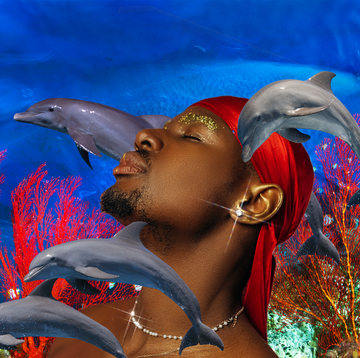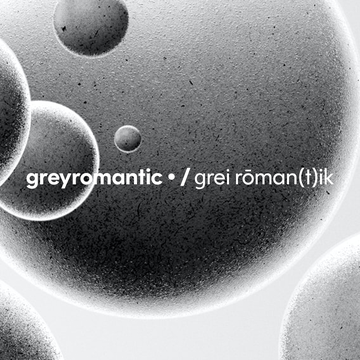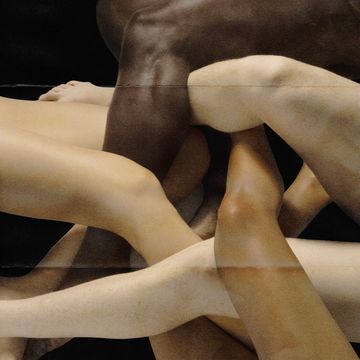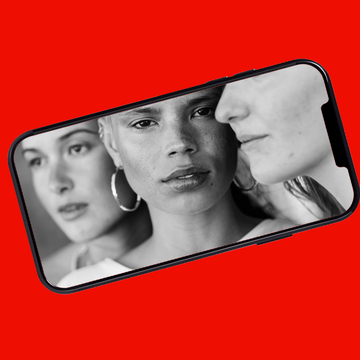As our understanding of sexuality and identity continues to grow and evolve, so does the language we use to describe it. Which, yes, means that it’s time for another sex vocab lesson. Cupiosexual, a term that falls under the broader asexual umbrella, is one of the more recent additions to our sexual vocabulary. According to certified sex educator Gigi Engle, a sex expert for 3Fun, “cupiosexual” was first coined around 2014, though it may have existed before then. As part of the asexual spectrum, cupiosexuality falls under the LGBTQ+ umbrella, and “refers to someone who wants a sexual relationship—or sex of some kind with someone—but doesn’t experience sexual attraction,” Engle explains.
While the term has been kicking around for at least a few years, it’s still not super common or well known yet, says psychotherapist Rachel Wright, MA, LMFT. However, cupiosexuality is gradually becoming a bigger part of the conversation surrounding asexuality and the diverse range of sexual orientations and identities that exist within the asexual spectrum, as sexologist Tanya M. Bass, Ph.D. explains.
“Under the asexual umbrella, or on the asexual spectrum, there are a plethora of identities,” says Wright. Cupiosexual is just one of the many more specific labels someone who identifies as asexual may choose to adopt. Like some of the other terms within the asexual spectrum with which you may already be familiar, such as greysexual or demisexual, cupiosexual refers to a more specific form or expression of asexuality. While asexuality describes someone who feels little to no attraction to others, cupiosexuality describes someone who still desires a sexual relationship or sexual behavior of some kind, despite feeling little to no attraction.
What Does Cupiosexual Mean?
Cupiosexuality refers to an aspect of asexuality when a person may want a sexual relationship, but does not experience sexual attraction, explains Bass.
"This person most likely identifies as asexual—and craves sex—despite feeling little to no attraction to others," says Wright.
It's important to remember that just because someone identifies as asexual, it doesn't mean they are celibate or abstinent, says Bass. Someone who identifies as cupiosexual is an example of this. "An asexual person simply does not feel sexual attraction, but may have sex for a host of reasons, including the physical pleasure of sex or the pleasure of their partner(s)," Bass explains. In other words, while someone who identifies as cupiosexual might enjoy the actual experience of having sex and would desire a sexual relationship with a partner, they are not sexually attracted to anyone.
"They can want sex for all kinds of reasons from closeness, to the release of orgasm, to simply enjoying the act of sex itself," says Engle. "Everyone is different."
What Is The Difference Between Cupiosexual, Asexual, and Greysexual?
Cupiosexuality falls under the asexual umbrella, so you could be cupiosexual and asexual, but not all those who identify as asexual necessarily identify as cupiosexual. It's kind of like how a square is a polygon, but not all polygons are squares (polygon = asexual, square = cupiosexual).
If an asexual person has no desire or longing for sexual attraction at all, the cupiosexual label wouldn't apply to them. There are also way more subsets on the asexuality spectrum besides just cupiosexual of course, including greysexual and demisexual.
Bass explains that the prefix "cupio" means a desire or longing for, which can help you remember the difference between cupiosexuality and other forms of asexuality like greysexuality. While greysexuality is defined as someone who only very rarely feels sexual attraction, cupiosexuality is wanting to feel, or longing, for sex.
Demisexual also falls under the asexual umbrella, but describes folks who need to have a strong emotional connection with someone in order to feel sexual attraction towards them.
Of course, as Engle puts it, "Language is constantly evolving, and so labels do as well." As we continue to acknowledge and understand asexuality as the diverse and nuanced spectrum it is, our vocabulary for the numerous gradations and expressions of asexuality only grows. Wright cites a number of related terms that are increasingly being used to describe different shades of asexuality, including: lithosexual, which describes someone who feels sexual attraction only for those who don’t reciprocate those feelings; autosexual, someone who only feels sexual attraction to themselves; apothisexual, someone who finds any sexual activity repulsive; and aegosexual, which literally means sex without self. (Translation: "This person experiences a disconnect between themselves and the subject of arousal," Wright explains.)
Basically, cupiosexual is just one of a growing number of labels someone may use to describe their specific experience of asexuality. That said, it's important to remember that these labels exist for a reason, and that reason is definitely not to make anyone feel like they have to condense their sexual identity into one specific term.
"Labels are meant to support you in finding peace and a feeling of belonging," says Wright. If cupiosexual—or any other term—doesn’t do that for you, "Ditch it," says Wright. "Be you."
Related Terms:
Want to get the hottest sex positions, the wildest confessions, and the steamiest secrets right to your inbox? Sign up for our sex newsletter ASAP.














